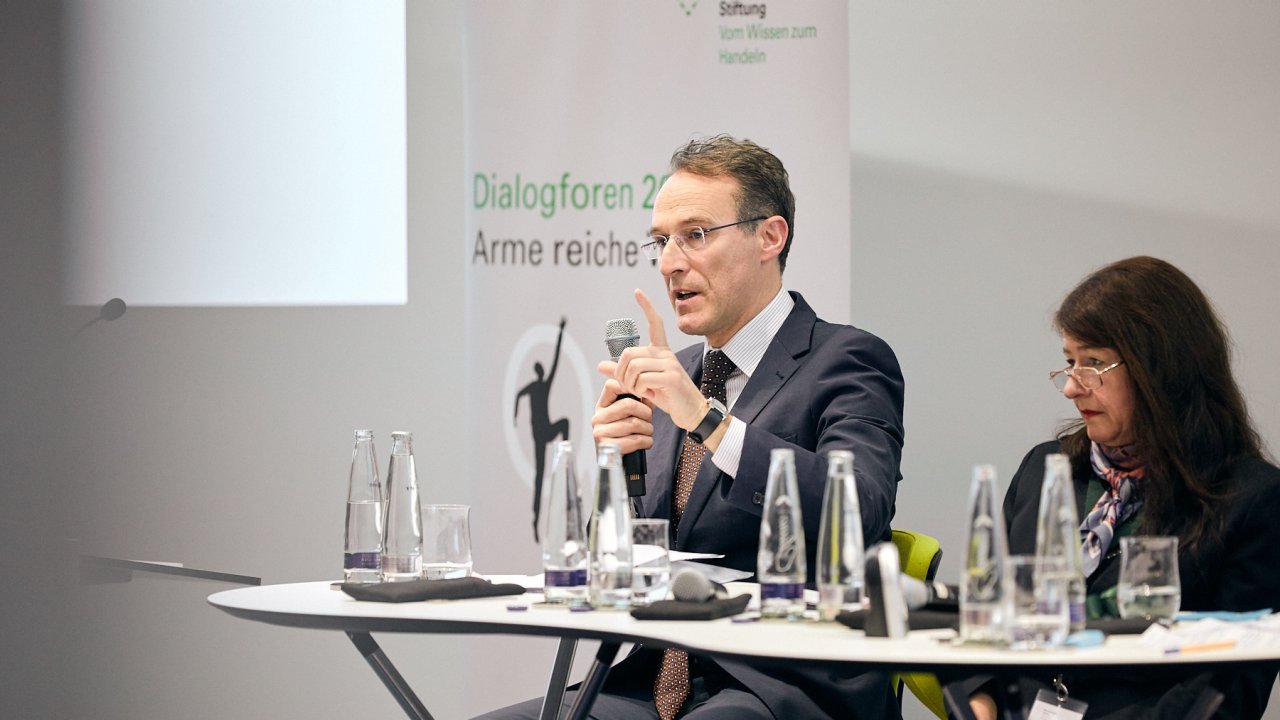
Poverty traps – When risk keeps you poor and poverty keeps you at risk
Dialogue Forum on 21 February 2019
properties.trackTitle
properties.trackSubtitle
People in poverty are exposed to increased risk. They are particularly susceptible to natural disasters and epidemics, and often suffer more in armed conflict situations. At the same time, these factors represent obstacles to people escaping from poverty. What practicable solutions can be envisaged to break out of this vicious circle?

Dr Sonja Ayeb-Karlsson, from the University of Sussex and UNU-EHS in Bonn, emphasised that it is women who often suffer disproportionately from poverty. A United Nations study shows that women are more likely to be killed in natural disasters, as well as in cyclones and heat waves. Climate change is likely to exacerbate this problem. “In 2017, 157 million people suffered from heatwaves, leading to billions of working hours being lost. There were substantially lower yields in agriculture as a result! Women often forego food themselves to ensure their children do not starve, and in turn, this weakens them even more,” explained Dr Ayeb-Karlsson. She added that migration is not always a solution either. “People migrate from rural areas with the hope of a better life. But while they may earn more money in cities, they often have to perform dangerous work. They also have higher expenses, can become sick and need medicine,” the researcher pointed out. So despite having a higher income, they are ultimately worse off than before. Yet at the same time, they no longer feature in statistics for people in extreme poverty.

Professor Regina Birner pointed out that the vast majority of the poor and those affected by food shortages still live in rural areas. She is Chair of Social and Institutional Change in Agricultural Development at the University of Hohenheim. She believed that one reason people cannot emerge from poverty is the wide variety of risks that smallholder agriculture is exposed to. Next to weather risks, she mentioned the risk of farm animals (assuming the farmers have any) falling sick or being stolen. Over 70 per cent of small farmers in sub-Saharan Africa are so poor that they cannot even afford to buy livestock. They must do everything by hand. Professor Birner explained that these farmers can then only manage two hectares of land. The manageable area would double if they had the assistance of farm animals. As a result, people can harvest just about enough to live on in good years, but in bad years they starve. This makes it difficult to escape from the poverty trap.
Index-based insurance practical
Investments in infrastructure such as irrigation systems and technology are needed to help small farmers. In the area of risk management, instruments such as index-based insurances can assist. The advantage here is that payouts are linked to a pre-defined event (what is known as the trigger), such as a specific amount of rainfall without the need for an insurance representative to determine the actual loss on site. This makes insurance products simpler and more convenient, as well as more affordable for small farmers. The downside is that the trigger may not be activated even when a loss has been suffered. In this context, the quality of the index and the trigger calculation are key.

Birner also has great hopes from digitalisation: She explained that the digital revolution offers small farmers in developing countries a unique opportunity to escape from poverty. But she believes special efforts are needed to ensure that small farmers, as well as women and marginalised groups, benefit from new technologies such as smartphone apps. In some cases, these apps can provide further training free of charge. Farmers, for example, can download precise instructions on the best conditions for sowing. This offers an immense potential for improving yields, even for people in remote rural districts.
All three experts agreed that efforts to combat poverty would not work without economic growth. “Growth must be sustainable and eco-friendly, and it must reach all sections of the population,” said economist Fernandes Teixeira. Because globalisation has shown that prosperity has passed many groups by. Indeed, in some cases, it has led to a drop in people’s standard of living.

Focus on farming
“Growth is also an absolute necessity in the farming sector, simply to feed the growing number of people, who are also changing their eating habits to consume more meat as they become better off,” Birner. added. At the same time, a greater focus needs to be placed on preserving resources. She does not reject out of hand genetically modified seeds, but is sceptical about the benefits. “Society needs to decide for itself if it wishes to go down this path,” she said. But she made it clear that she does not share the opinion that we cannot do anything without gene technology.
It is evident that development assistance – whether it comes from non-government organisations (NGOs), the private sector, or from governments, must walk a fine line. Only then can it protect recipients in the long term against starvation, poor living conditions in slums, and disease. We should see combating poverty as a moral obligation, not just in developing countries, but here at home as well. Otherwise, the vicious circle of poverty will continue and the countries that are exposed to the greatest risks will continue to be dragged down.
The next dialogue forum will be held on 12 March 2019 with the subject for discussion “Win-win for everyone – Bridging the business divide”.
06 March 2019